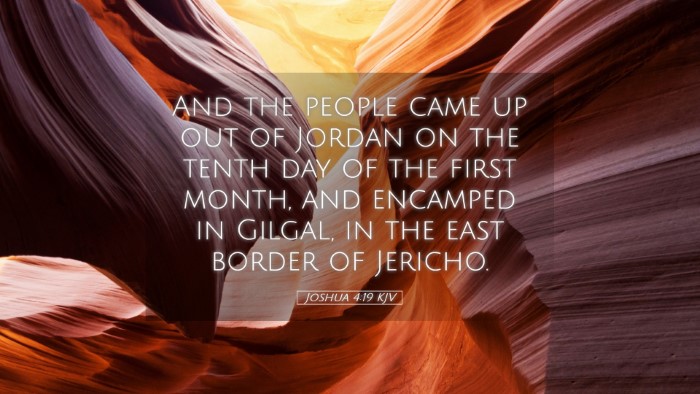Old Testament
Genesis Exodus Leviticus Numbers Deuteronomy Joshua Judges Ruth 1 Samuel 2 Samuel 1 Kings 2 Kings 1 Chronicles 2 Chronicles Ezra Nehemiah Esther Job Psalms Proverbs Ecclesiastes Song of Solomon Isaiah Jeremiah Lamentations Ezekiel Daniel Hosea Joel Amos Obadiah Jonah Micah Nahum Habakkuk Zephaniah Haggai Zechariah MalachiJoshua 4:19
Joshua 4:19 KJV
And the people came up out of Jordan on the tenth day of the first month, and encamped in Gilgal, in the east border of Jericho.
Joshua 4:19 Bible Commentary
Commentary on Joshua 4:19
Joshua 4:19 states: "And the people came up out of Jordan on the tenth day of the first month, and encamped in Gilgal, in the east border of Jericho." This verse marks a significant moment in the history of Israel as they enter the Promised Land.
Introduction
This passage encapsulates the conclusion of Israel's long journey from Egypt, through the wilderness, and into Canaan. It serves as a pivotal point in Israel's national identity as they transition from wanderers to a settled people, sanctioned by God to inhabit the land. Various commentaries provide rich insights into the theological and historical implications of this moment.
Historical Context
Understanding the historical context is crucial for interpreting this verse. Israel had wandered for forty years and was now in the land flowing with milk and honey. The mention of the “tenth day of the first month” is significant as it relates to the preparation for the Passover, which was deeply embedded in the collective memory of the Israelites.
- Matthew Henry: Henry underscores the importance of the timing, correlating it with the preparation for Passover, suggesting that God orchestrated their arrival to coincide with a time of remembrance.
- Albert Barnes: Barnes points out the geographical significance of Gilgal. Located near Jericho, it was strategically important for military and agricultural reasons as they begin to establish themselves in the land.
- Adam Clarke: Clarke elaborates on the transition from the wilderness to Canaan, highlighting that this entry was a fulfillment of God's promise to Abraham, Isaac, and Jacob.
Theological Significance
This verse is rich with theological implications concerning God's faithfulness, the significance of landmarks in spiritual journeys, and the identity of God's people.
- God's Faithfulness: The arrival in Gilgal represents the faithfulness of God to His covenant. As noted by Henry, it marks the culmination of a long and arduous journey, reminiscent of God's promises in Exodus and Deuteronomy.
- Identity of the People: The encampment signifies not just a geographical transition, but a spiritual one. Barnes remarks that the Israelites are now a nation with a distinct identity that is claimed by God.
- The Importance of Memory: Clarke notes that this event sets the stage for future generations to remember God’s mighty works, emphasizing the need for reminders of God’s past faithfulness to inspire future trust.
Practical Applications
For pastors, students, and theologians, Joshua 4:19 provides an opportunity to reflect on themes of transition, faithfulness, and identity in their ministries and personal lives.
- Celebrating Spiritual Milestones: Just as Israel celebrated their entry into the Promised Land, congregations can create ceremonies or rituals to mark significant spiritual milestones.
- Encouraging Remembrance: This passage serves as a reminder of the importance of teaching and sharing stories of God's provision and faithfulness to encourage believers in their current journeys.
- Community and Identity: Understanding that we are part of a larger story can help cultivate a sense of community and purpose among believers. This transition period can encourage discussions on identity in Christ, community, and mission.
Conclusion
Joshua 4:19 is not merely a historical note; it is a profound reminder of God's faithfulness, the importance of remembrance, and the significance of community identity. By studying and preaching this passage, one can inspire a deeper trust in God's promises and encourage believers to reflect on their own journeys of faith.


